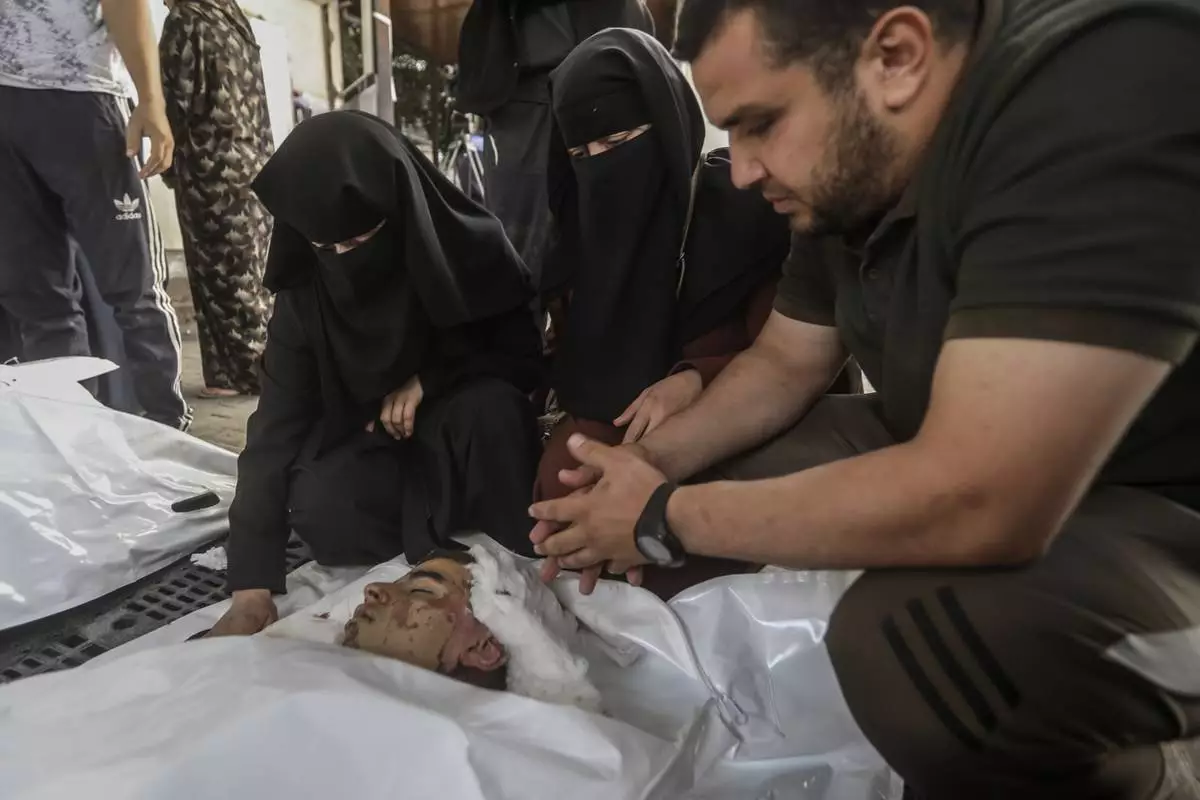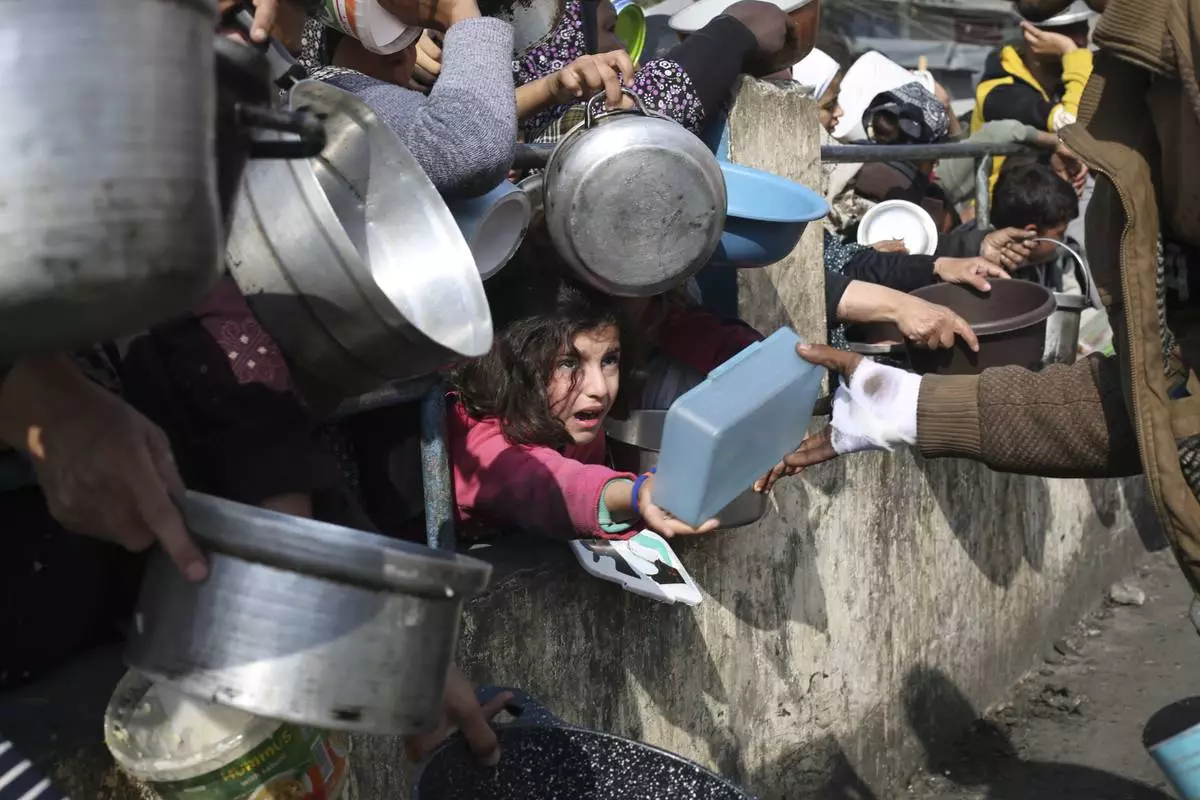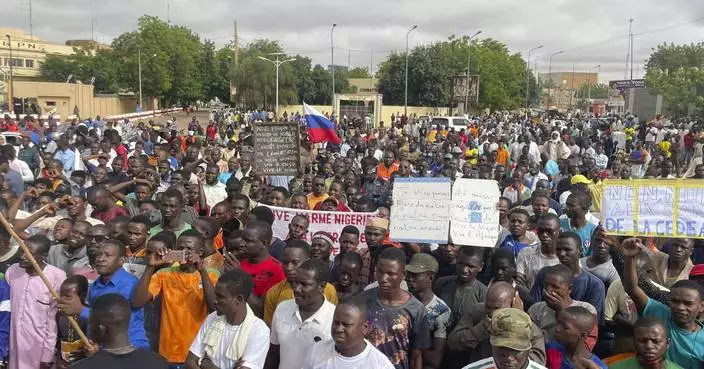President Donald Trump falsely asserted that he predicted Osama bin Laden's 9/11 attack on the World Trade Center in a news conference Sunday aimed at showcasing his administration's accomplishments in stemming the terrorist threat abroad.
A look at the president's claims at the briefing, where he announced the death of Abu Bakr al-Baghdadi, the leader of the Islamic State group:
TRUMP: "I'm writing a book ... About a year before the World Trade Center came down, the book came out. I was talking about Osama bin Laden. I said, 'You have to kill him. You have to take him out.' Nobody listened to me." Trump added that people said to him, "'You predicted that Osama Bin Laden had to be killed, before he knocked down the World Trade Center.' It's true."
THE FACTS: It's not true.
His 2000 book, "The America We Deserve," makes a passing mention of bin Laden but did no more than point to the al-Qaida leader as one of many threats to U.S. security. Nor does he say in the book that bin Laden should have be killed.
As part of his criticism of what he considered Bill Clinton's haphazard approach to U.S. security as president, Trump wrote: "One day we're told that a shadowy figure with no fixed address named Osama bin Laden is public enemy Number One, and U.S. jetfighters lay waste to his camp in Afghanistan. He escapes back under some rock, and a few news cycles later it's on to a new enemy and new crisis."
The book did not call for further U.S. action against bin Laden or al-Qaida to follow up on attacks Clinton ordered in 1998 in Afghanistan and Sudan after al-Qaida bombed the U.S. embassies in Kenya and Tanzania. The U.S. attacks were meant to disrupt bin Laden's network and destroy some of al-Qaida's infrastructure, such as a factory in Sudan associated with the production of a nerve gas ingredient. They "missed" in the sense that bin Laden was not killed in them, and al-Qaida was able to pull off 9/11 three years later.
In passages on terrorism, Trump's book does correctly predict that the U.S. was at risk of a terrorist attack that would make the 1993 World Trade Center bombing pale by comparison. That was a widespread concern at the time, as Trump suggested in stating "no sensible analyst rejects this possibility."
Still, Trump did not explicitly tie that threat to al-Qaida and thought an attack might come through a miniaturized weapon of mass destruction, like a nuclear device in a suitcase or anthrax.
TRUMP: "Nobody ever heard of Osama bin Laden until really the World Trade Center."
THE FACTS: That's incorrect. Bin Laden was well known by the CIA, other national security operations, experts and the public long before 9/11, with the CIA having a unit entirely dedicated to bin Laden going back to the mid-1990s. The debate at the time was over whether Clinton and successor President George W. Bush could have done more against al-Qaida to prevent the 2001 attacks.
Find AP Fact Checks at http://apne.ws/2kbx8bd
Follow @APFactCheck on Twitter: https://twitter.com/APFactCheck
WASHINGTON (AP) — Israel this week briefed Biden administration officials on a plan to evacuate Palestinian civilians ahead of a potential operation in the southern Gaza city of Rafah aimed at rooting out Hamas militants, according to U.S. officials familiar with the talks.
The officials, who were not authorized to comment publicly and requested anonymity to speak about the sensitive exchange, said that the plan detailed by the Israelis did not change the U.S. administration’s view that moving forward with an operation in Rafah would put too many innocent Palestinian civilians at risk.
Israeli Prime Minister Benjamin Netanyahu has vowed to carry out a military operation in Rafah despite warnings from President Joe Biden and other western officials that doing so would result in more civilian deaths and worsen an already dire humanitarian crisis.
The Biden administration has said there could be consequences for Israel should it move forward with the operation without a credible plan to safeguard civilians.
“Absent such a plan, we can’t support a major military operation going into Rafah because the damage it would do is beyond what’s acceptable,” U.S. Secretary of State Antony Blinken said late Friday at the Sedona Forum, an event in Arizona hosted by the McCain Institute.
Some 1.5 million Palestinians have sheltered in the southern Gaza city as the territory has been ravaged by the war that began on Oct. 7 after Hamas militants attacked Israel, killing 1,200 people and taking about 250 hostages.
The United Nations humanitarian aid agency on Friday said that hundreds of thousands of people would be “at imminent risk of death” if Israel moves forward with the Rafah assault. The border city is a critical entry point for humanitarian aid and is filled with displaced Palestinians, many in densely packed tent camps.
The officials added that the evacuation plan that the Israelis briefed was not finalized and both sides agreed to keep discussing the matter.
White House press secretary Karine Jean-Pierre told reporters on Friday that no “comprehensive” plan for a potential Rafah operation has been revealed by the Israelis to the White House. The operation, however, has been discussed during recent calls between Biden and Netanyahu as well as during recent virtual talks with top Israeli and U.S. national security officials.
“We want to make sure that those conversations continue because it is important to protect those Palestinian lives — those innocent lives,” Jean-Pierre said.
The revelation of Israel's continued push to carry out a Rafah operation came as CIA director William Burns arrived Friday in Egypt, where negotiators are trying to seal a cease-fire accord between Israel and Hamas.
Hamas is considering the latest proposal for a cease-fire and hostage release put forward by U.S., Egyptian and Qatari mediators, who are looking to avert the Rafah operation.
They have publicly pressed Hamas to accept the terms of the deal that would lead to an extended cease-fire and an exchange of Israeli hostages taken captive on Oct. 7 and Palestinian prisoners in Israeli jails.
Hamas has said it will send a delegation to Cairo in the coming days for further discussions on the offer, though it has not specified when.
Israel, and its allies, have sought to increase pressure on Hamas on the hostage negotiation. Signaling that Israel continues to move forward with its planning for a Rafah operation could be a tactic to nudge the militants to finalize the deal.
Netanyahu said earlier this week that Israeli forces would enter Rafah, which Israel says is Hamas’ last stronghold, regardless of whether a truce-for-hostages deal is struck. His comments appeared to be meant to appease his nationalist governing partners, and it was not clear whether they would have any bearing on any emerging deal with Hamas.
Blinken visited the region, including Israel, this week and called the latest proposal “extraordinarily generous” and said “the time to act is now.”
In Arizona on Friday, Blinken repeated remarks he made earlier this week that "the only thing standing between the people of Gaza and a cease-fire is Hamas.”

The Chahine family prepares to bury two adults and five boys and girls under the age of 16 after an overnight Israeli strike in Rafah, southern Gaza Strip, Friday, May 3, 2024. An Israeli strike on the city of Rafah on the southern edge of the Gaza Strip killed several people, including children, hospital officials said Friday. (AP Photo/Ismael Abu Dayyah)

FILE - Palestinians line up for free food during the ongoing Israeli air and ground offensive on the Gaza Strip in Rafah, Jan. 9, 2024. A top U.N. official said Friday, May 3, 2024, that hard-hit northern Gaza was now in “full-blown famine" after more than six months of war between Israel and Hamas and severe Israeli restrictions on food deliveries to the Palestinian territory. (AP Photo/Hatem Ali, File)

Palestinians rescue a woman survived after the Israeli bombardment on a residential building of Abu Alenan family in Rafah, southern Gaza Strip, early Saturday, May 4, 2024. (AP Photo/Ismael Abu Dayyah)

President Joe Biden walks across the South Lawn of the White House as he talks with White House press secretary Karine Jean-Pierre Thursday, May 2, 2024, in Washington, after returning from a trip to North Carolina. (AP Photo/Mark Schiefelbein)













